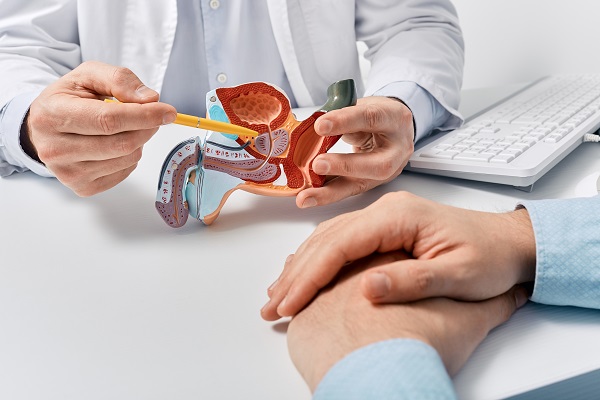What Is Prostate Cancer?

Prostate cancer is one of the most common cancers affecting men. Screening for those at higher risk is key, as this type of cancer may be symptom-free in its early stages. Therefore, knowing the risk factors and symptoms is important to understand when to talk to your doctor. Prostate cancer usually progresses slowly; with early intervention, oncologists can treat it successfully.
Prostate cancer explained
Prostate cancer is a type of cancer that begins when cells of the prostate gland grow out of control. The prostate is a small gland located under a male patient's bladder that produces seminal fluid to nourish sperm. Cancer in the prostate starts with changes in cell DNA that cause the cells to divide more rapidly than they normally would. Like most cancers, prostate cancer varies in severity and how quickly and aggressively it spreads.
Symptoms of prostate cancer
An important thing to know about prostate cancer is that it often shows no symptoms in its early stages. For this reason, patients at higher risk need to talk to their doctor about how they can protect themselves. According to the Centers for Disease Control and Prevention (CDC), symptoms of prostate cancer can include:
- Difficulties urinating
- Urinating often, especially at night
- Blood in urine or seamen
- Back, pelvis, or hip pain
- Pain during ejaculation or urination
Unexplained weight loss and erectile dysfunction can also be signs of the disease. It is also important to note that these symptoms can be associated with aging and other conditions.
Risk factors
Because early intervention is so crucial in prostate cancer treatment, It is vital for men to know what factors increase their risk. Prostate cancer becomes more likely with age and is most common in patients over 50. Family history is another indicator of one’s risk. Those with one or more close relatives who have cancer are more likely to develop the disease, as are patients with a family history of the BRCA1 or BRCA2 genes that increase breast cancer risk.
For reasons that are not entirely clear, Black men develop prostate cancer at a higher rate than patients of other races, and their cancers tend to be more aggressive. In addition, male patients who are obese are more likely to develop prostate cancer than those at a healthy weight. Patients with many risk factors should talk to their doctor about screening and other preventative measures.
Screening and prevention
A patient's risk of prostate cancer will largely determine his screening schedule. Patients at average risk may not need their first screening until age 55. Those at higher risk may start screenings earlier, at 45. Male patients are encouraged to talk to their doctor about their family history of the disease and other risk factors.
In addition to getting the recommended screenings, all male patients should take certain steps to reduce their risk. Many of these involve just living a healthy lifestyle, such as maintaining a healthy weight, exercising regularly, eating healthy, and quitting smoking. If a doctor determines a patient is at increased risk, they may recommend medications to reduce the risk.
Diagnosis and treatment
Initial screening tests may include a digital rectal exam (DRE) or a prostate-specific antigen test, also known as a PSA test. The PSA test uses a sample of the patient’s blood to check for prostate-specific antigens. A certain amount is normal; however, if a higher amount is found, it could signal trouble and the need for further testing. During a digital rectal exam, the doctor uses a gloved finger in the rectum to examine the prostate for abnormalities. Depending on the findings of these preliminary tests, the doctor may order further testing, such as a biopsy.
Treatment is especially effective if the cancer is caught before it spreads outside the prostate. Even if treatment is not necessary for slow-growing and less aggressive forms, the doctor will want to monitor it closely. More aggressive cancers may require radiation treatment, chemotherapy, hormone therapy, surgery, or a combination of therapies. The good news is that prostate cancer grows slowly for most men and, if caught early, is very treatable.
Talk to your doctor about prostate cancer
Male patients, especially those over 50 with a high risk of prostate cancer, should talk to their doctor about protecting themselves. Though a cancer diagnosis of any kind may sound scary, prostate cancer is highly treatable, and with the right diagnosis and treatment, many patients have good outcomes. To learn more about protecting yourself from prostate cancer, call our oncology team today.
Request an appointment here: https://lindenbergcancer.com or call Lindenberg Cancer & Hematology Center at (856) 475-0876 for an appointment in our Marlton office.
Check out what others are saying about our services on Yelp: Prostate Cancer in Marlton, NJ.
Recent Posts
Blood clot disorders include a spectrum of inherited or acquired conditions that disrupt healthy circulation, elevate the risk of blockage, and threaten vital organs. An oncologist frequently monitors patients for clotting complications because cancer, certain chemotherapies, and reduced mobility intensify thrombotic tendencies. Early recognition of warning signs, together with prompt intervention, significantly lowers the possibility…
Lung cancer treatment has advanced significantly in recent years, allowing for more personalized approaches that improve outcomes and reduce unnecessary side effects. Personalized lung cancer treatment plans are developed based on several factors, including the type and stage of cancer, genetic markers, overall health, and the patient's unique response to specific therapies. These tailored strategies…
An ovarian cancer diagnosis can be scary, as this form of cancer often develops without noticeable symptoms in the early stages. As the disease progresses, it can become more difficult to treat, making early awareness important. Knowing the signs, understanding the diagnostic process, and learning about treatment options from an oncologist can offer patients hope…
Gynecological cancer treatments target cancers that affect the female reproductive organs, such as ovarian, uterine, cervical, vaginal, and vulvar cancers. Fortunately, there have been significant medical advances in cancer treatment that have greatly improved patient outcomes, allowing oncologists to adjust therapies to fit each patient's needs and overall health. These targeted treatments work better than…


